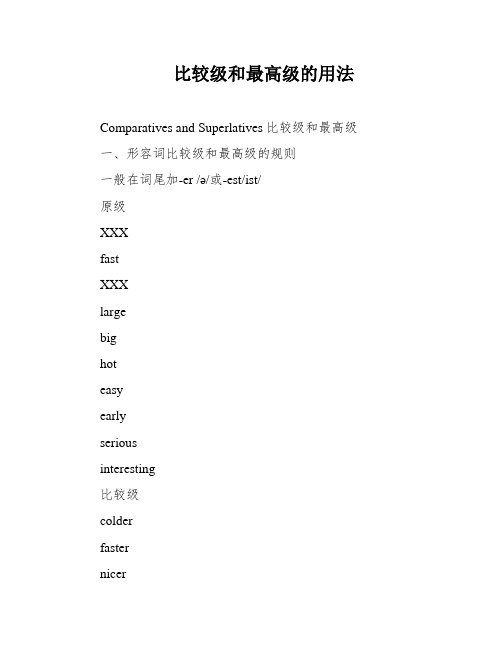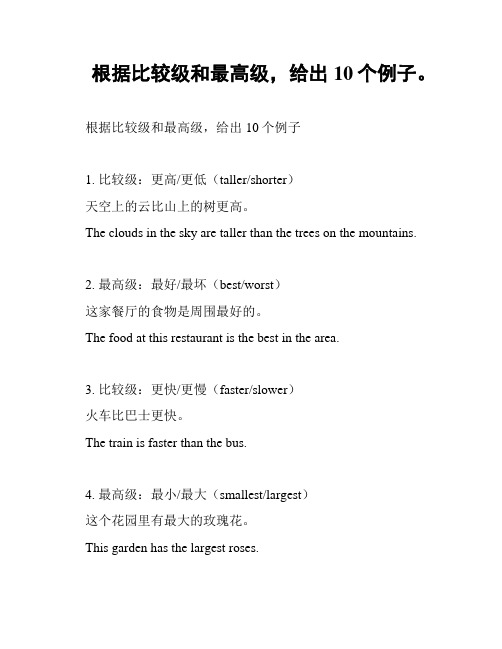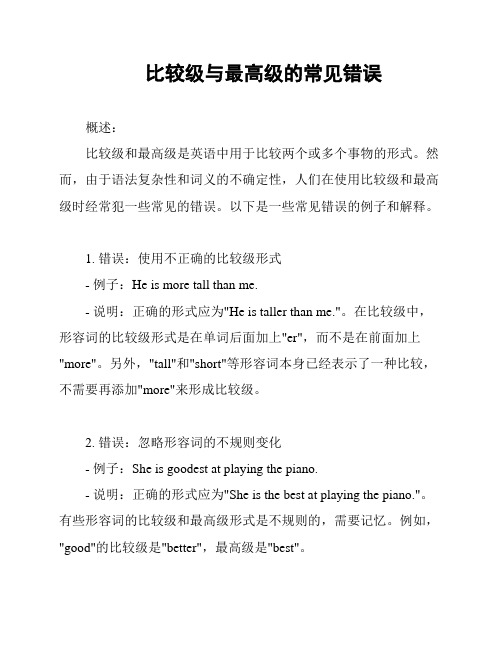比较级和最高级
形容词及副词的比较级和最高级的用法

比较级和最高级一、形容词比较级和最高级的规则其它不规则的变化:二、形容词比较级基本用法1、与than搭配的基本形式(1)名词/代词He is older than me.(2) 动名词/从句Skiing is more exciting than skating.(3) 状语/动词/形容词/副词①much/a lot/ a bit/ a little/ slightly/any/ no/ even/ some/ stillEg: She is feeling a lot/much better today.Do you feel any better today?She is no older than mike.②数词My sister is ten years younger than me.2、特殊搭配1)“比较级+and+比较级”表示“越来越……”eg: He becomes fatter and fatter. She is growing more and more beautiful2)“The +比较级…,the +比较级”表示“越……,越……”The busier he is ,the happier he feels3)表示两者中”较……“时,用the + 形容词比较级+ of 短语来表达。
He is the taller of the two.4)在含有or的选择疑问句中,如果有两者供选择,前面的形容词要用比较级形式。
5)More ...than...的几种用法和含义①more B than A = less A than B. He is more lazy than slow at his work= he is less slow than lazy at his work.②no/not any more/less… than…两个都不(neither)③More than不仅仅是,no Less than(不)少于,more or less 差不多The work is more or less finished.one more=another more Any other+名词单数(名词可以省略)3、修饰比较级的词①a bit, a little, rather, much,far, by far, many, a lot, lots, a great deal, any, still, even(very只修饰原级)②用表示倍数的词或度量名词作修饰语。
比较级和最高级的用法

比较级和最高级的用法Comparatives and Superlatives比较级和最高级一、形容词比较级和最高级的规则一般在词尾加-er /ə/或-est/ist/原级XXXfastXXXlargebighoteasyearlyseriousinteresting比较级colderfasternicerlargerbiggerhotterXXXXXXmore seriousmore interesting第一流coldestfastestnicestlargestbiggesthottestXXXXXXmost seriousMost interesting以字母e末端的描述词,加-r或-st以重读闭音节结尾且末尾只有一个辅音字母时,应先双写这个子音字母;再加-es或-est以“子音字母+y”末端的词,先改“y”为“i”,再加-er或-est 在词前加more或most其它不规则的变化:原形Good/wellBad/illMany/muchlittlefar比较级betterworsemorelessXXX最高级XXXWorstMostLeastfarthest2、描述词比力级根本用法1、定义:两个人或物之间的比较。
表示“较……”或“更……一些”。
标志词:than(比).2、与than搭配的词语方式(1)名词/代词He XXX.(2)动名词/从句Skiing is XXX.(3)状语/动词/形容词3、描述词/副词比力级前的润饰语(1)much/a lot/ a bit/ a little/ slightlyShe is XXX today.(2)any/ no/ even/ some/ stillDo you XXX today?XXX.(3)数词My sister is ten years younger than me.4、比较级的特殊搭配1)“比较级+and+比较级”表示“越来越……”eg: XXX.他愈来愈胖了。
初中中的比较级与最高级的特殊形式详细解析

初中中的比较级与最高级的特殊形式详细解析比较级和最高级是我们学习英语时经常遇到的语法知识点,而在初中阶段,我们还要理解和掌握比较级和最高级的特殊形式。
本文将详细解析初中中的比较级与最高级的特殊形式,帮助同学们更好地应对这一知识点。
一、比较级的特殊形式1. 辅音字母+y结尾的形容词辅音字母+y结尾的形容词,在变比较级时,需要将y变为i,再加-er。
例如:happy → happierfunny → funnier2. 以“重读闭音节+辅音字母+元音字母”结尾的形容词以“重读闭音节+辅音字母+元音字母”结尾的形容词,需要双写最后一个辅音字母,再加-er。
例如:big → biggerthin → thinner多音节和部分双音节形容词在比较级前需要使用more。
例如:beautiful → more beautifulinteresting → more interesting二、最高级的特殊形式1. 辅音字母+y结尾的形容词辅音字母+y结尾的形容词,在变最高级时,需要将y变为i,再加-est。
例如:happy → happiestfunny → funniest2. 以“重读闭音节+辅音字母+元音字母”结尾的形容词以“重读闭音节+辅音字母+元音字母”结尾的形容词,需要双写最后一个辅音字母,再加-est。
例如:big → biggestthin → thinnest多音节和部分双音节形容词在最高级前需要使用most。
例如:beautiful → most beautifulinteresting → most interesting除了以上特殊形式之外,有些形容词在比较级和最高级的变化中也具有特殊性。
1. good, better, bestgood是一个特殊的形容词,其比较级为better,最高级为best。
在比较级和最高级的变化中不遵循一般规则,需要单独记忆。
2. bad, worse, worstbad是一个特殊的形容词,其比较级为worse,最高级为worst。
比较级和最高级常见词

1) 经常用来修饰形容词或副词的比较级形式,以示加强语气。
常见的词或短语有:much (very much,too much ),even,still,far,rather,any, no,not,by far, a lot,a little,a bit,a great deal 等。
He is getting (too) much fatter these days(加强语气时,可以使用too much 或 very much。
)It was cold yesterday, but it’s even colder today.There was a number of people out this afternoon, far more than last Sunday.His work is better by far than that of any other printer in the city.She was by far the better actress in the West.2)经常用来修饰形容词或副词的最高级,用来加强语气。
常见的词或短语。
如:much the ,the very , the ,by far,by far the ,not quite the, nearly, almost, 等。
【注】:very不能修饰比较级,却可修饰最高级,但它与一般的修饰最高级的副词有所不同,即它要放在最高级前的定冠词之后,而不是之前。
(另外,second, third, next等也要放在定冠词之后)This is much the / by far the most difficult of the five questions.(much经常置于定冠词之前。
)The last novel of his is by far the best he has written.The Pacific is the largest ocean in the world by far. (by far可以置于定冠词之前,也可以置于最高级之后。
比较级和最高级知识点

比较级和最高级知识点比较级和最高级是英语语法中的两个非常基础的知识点。
它们顾名思义,是用来表示两者之间相互比较的,因此在进行英语语言表达的时候非常重要。
在本文中,我们将深入探讨比较级和最高级,并介绍它们的用法、规则和常见错误。
1. 比较级比较级用来表示两个人或物之间的比较,通常用在形容词或副词之前,形式为原形+er。
例如:taller,stronger,smaller,faster 等。
比较级的用法主要有以下三种:(1)表示两个人或物的比较,例如:He is taller than me.(他比我高。
)(2)表示两个动作或状态的比较,例如:I run faster than him.(我比他跑得快。
)(3)表示程度的加深,例如:The weather is getting colder and colder.(天气越来越冷。
)需要注意的是,有些形容词和副词的比较级形式并不是在原形后面加-er,而是在前面加more,例如: more interesting,more difficult,more beautiful等。
2. 最高级最高级用来表示三个或三个以上人或物之间的比较,通常用在形容词或副词之前,形式为原形+est。
例如:tallest,strongest,smallest,fastest等。
最高级的用法主要有以下三种:(1)表示一组人或物中最高的,例如:Fred is the tallest boy in our class.(弗雷德是我们班最高的男生。
)(2)表示一组动作或状态中程度最高的,例如:This is the most interesting book I've ever read.(这是我读过的最有趣的书。
)(3)表示程度的极限,例如:It was the hottest day of the year.(这是全年最热的一天。
)需要注意的是,和比较级一样,有些形容词和副词的最高级形式也不是在原形后面加-est,而是在前面加most,例如: most interesting,most difficult,most beautiful等。
根据比较级和最高级,给出10个例子。

根据比较级和最高级,给出10个例子。
根据比较级和最高级,给出10个例子1. 比较级:更高/更低(taller/shorter)天空上的云比山上的树更高。
The clouds in the sky are taller than the trees on the mountains.2. 最高级:最好/最坏(best/worst)这家餐厅的食物是周围最好的。
The food at this restaurant is the best in the area.3. 比较级:更快/更慢(faster/slower)火车比巴士更快。
The train is faster than the bus.4. 最高级:最小/最大(smallest/largest)这个花园里有最大的玫瑰花。
This garden has the largest roses.5. 比较级:更容易/更困难(easier/harder)研究新语言比研究新技能更困难。
Learning a new language is harder than learning a new skill.6. 最高级:最长/最短(longest/shortest)这条河是该国最长的河流。
This river is the longest in the country.7. 比较级:更重/更轻(heavier/lighter)这个箱子比那个箱子更重。
This box is heavier than that box.8. 最高级:最美/最丑(most beautiful/ugliest)那座建筑物是城市最美的建筑之一。
That building is one of the most beautiful in the city.9. 比较级:更聪明/更愚蠢(smarter/dumber)他比他的弟弟更聪明。
He is smarter than his younger brother.10. 最高级:最贵/最便宜(most expensive/cheapest)这件珠宝是最贵的。
比较级与最高级的常见错误

比较级与最高级的常见错误概述:比较级和最高级是英语中用于比较两个或多个事物的形式。
然而,由于语法复杂性和词义的不确定性,人们在使用比较级和最高级时经常犯一些常见的错误。
以下是一些常见错误的例子和解释。
1. 错误:使用不正确的比较级形式- 例子:He is more tall than me.- 说明:正确的形式应为"He is taller than me."。
在比较级中,形容词的比较级形式是在单词后面加上"er",而不是在前面加上"more"。
另外,"tall"和"short"等形容词本身已经表示了一种比较,不需要再添加"more"来形成比较级。
2. 错误:忽略形容词的不规则变化- 例子:She is goodest at playing the piano.- 说明:正确的形式应为"She is the best at playing the piano."。
有些形容词的比较级和最高级形式是不规则的,需要记忆。
例如,"good"的比较级是"better",最高级是"best"。
3. 错误:忽略冠词的使用- 例子:He is tallest boy in the class.- 说明:正确的形式应为"He is the tallest boy in the class."。
在最高级中,需要使用冠词"the"来表示唯一性,即最高级是该事物所有可能中的最高或最好。
4. 错误:错误地使用"than"比较- 例子:She is more intelligent than him.- 说明:这个例子并不是错误,但它可以改进。
当比较两个事物时,正确的形式是:"She is more intelligent than he is."。
比较级和最高级用法知识点总结

比较级和最高级用法知识点总结在英语学习中,比较级和最高级是非常重要的语法知识点。
掌握它们的用法,对于准确、生动地表达程度和进行比较至关重要。
接下来,让我们详细地了解一下比较级和最高级的用法。
一、比较级的构成1、一般在词尾加 er比如:tall taller,short shorter2、以不发音的字母 e 结尾的单词,直接加 r例如:nice nicer,late later3、重读闭音节词,末尾只有一个辅音字母,双写这个辅音字母,再加 er像:big bigger,hot hotter4、以“辅音字母+y”结尾的单词,把 y 变为 i,再加 er比如:heavy heavier,easy easier5、多音节词和部分双音节词,在词前加 more例如:beautiful more beautiful,interesting more interesting二、比较级的用法1、表示两者之间的比较“A + be 动词+比较级+ than +B”,意思是“A 比 B 更……”例如:He is taller than me(他比我高。
)2、表示“越来越……”“比较级+ and +比较级”例如:It's getting colder and colder(天气变得越来越冷。
)3、“the +比较级,the +比较级”,表示“越……,越……”比如:The more you practice, the better you will be(你练习得越多,就会越好。
)4、可以用 much、a little、a lot、even、far 等修饰比较级,加强程度例如:He is much taller than his brother(他比他弟弟高得多。
)三、最高级的构成1、一般在词尾加 est例如:small smallest,long longest2、以不发音的字母 e 结尾的单词,直接加 st比如:fine finest,wide widest3、重读闭音节词,末尾只有一个辅音字母,双写这个辅音字母,再加 est像:fat fattest,thin thinnest4、以“辅音字母+y”结尾的单词,把 y 变为 i,再加 est例如:happy happiest,busy busiest5、多音节词和部分双音节词,在词前加 most例如:important most important,difficult most difficult四、最高级的用法1、用于三者或三者以上的比较“A + be 动词+ the +最高级+范围”,意思是“A 在……中是最……的”例如:She is the most beautiful girl in our class(她是我们班最漂亮的女孩。
- 1、下载文档前请自行甄别文档内容的完整性,平台不提供额外的编辑、内容补充、找答案等附加服务。
- 2、"仅部分预览"的文档,不可在线预览部分如存在完整性等问题,可反馈申请退款(可完整预览的文档不适用该条件!)。
- 3、如文档侵犯您的权益,请联系客服反馈,我们会尽快为您处理(人工客服工作时间:9:00-18:30)。
一、形容词的比较级和最高级变化规则;1、规则变化:(1) 单音节词和少数双音节词一般在词尾加er或est:如: small ---smaller --- the smallest(2) 以不发音的e字母结尾的加r,或st:如: late --- later --- the latest(3) 以辅音字母加y结尾的变y为I加er或est:如: easy --- easier --- the easiest(4)以一个辅音字母结尾的重读闭音节词双写最后一个辅音字母再加er或est:如: big --- bigger --- the biggest以er,ow结尾的双音节词加er 或est如: slow --- slower --- the slowest(5) 多音节词前加more或most, 副词最高级前省略the.如: important --- more important --- the most important2.不规则变化good / well --- better --- the best 好bad / badly / ill --- worse --- the worst 坏many / much --- more --- the most 多little --- less --- the least 少old --- older / elder --- the oldest / the oldest 老, 旧far --- farther / further --- the farthest / the furthest 远常见形容词比较级、最高级变化一览表1.在形容词词尾加上“er”“est”构成比较级、最高级:bright(明亮的)—brighter—brightest broad(广阔的)—broader—broadest cheap(便宜的)—cheaper—cheapest clean(干净的)—cleaner—cleanestclever(聪明的)—cleverer—cleverest cold(寒冷的)—colder—coldest cool(凉的)—cooler—coolest dark(黑暗的)—darker—darkest deep(深的)—deeper—deepest fast(迅速的)—faster—fastestfew(少的)—fewer—fewest great(伟大的)—greater—greatest hard(困难的,硬的)—harder—hardest high(高的)—higher—highest kind(善良的)—kinder—kindest light(轻的)—lighter—lightest long(长的)—longer—longest loud(响亮的)—louder—loudestlow(低的)—lower—lowest near(近的)—nearer—nearestnew(新的)—newer—newest poor(穷的)—poorer—poorestquick(快的)—quicker—quickest quiet(安静的)—quieter—quietestrich(富裕的)—richer—richest short(短的)—shorter—shortestslow(慢的)—slower—slowest small(小的)—smaller—smallest smart(聪明的)—smarter—smartest soft(柔软的)—softer—softest strong(强壮的)—stronger—strongest sweet(甜的)—sweeter—sweetest tall(高的)-taller-tallest thick(厚的)—thicker—thickest warm(温暖的)—warmer—warmest weak(弱的)—weaker—weakest young(年轻的)—younger—youngest2.双写最后一个字母,再加上“er”“est”构成比较级、最高级:big(大的)—bigger—biggest fat(胖的)—fatter—fattesthot(热的)—hotter—hottest red(红的)—redder—reddestsad(伤心的)—sadder—saddest thin(瘦的)—thinner—thinnestwet(湿的)—wetter—wettest mad(疯的)—madder—maddest3.以不发音的字母e结尾的形容词,加上“r”“st”构成比较级、最高级:able(能干的)—abler—ablest brave(勇敢的)—braver—bravest close(接近的)—closer—closest fine(好的,完美的)—finer—finest large(巨大的)—larger—largest late(迟的)—later—latestnice(好的)—nicer—nicest ripe(成熟的)—riper—ripestrude(粗鲁的)—ruder—rudest safe(安全的)—safer—safest strange(奇怪的)—stranger—strangest wide(宽广的)—wider—widest wise(睿智的,聪明的)—wiser—wisest white(白的)—whiter—whitest4.以字母y结尾的形容词,把y改为i,再加上“er”“est”构成比较级、最高级: busy(忙碌的)—busier—busiest dirty(脏的)—dirtier—dirtiestdry(干燥的)—drier—driest early(早的)—earlier—earliest easy(容易的)—easier—easiest friendly(友好的)—friendlier—friendliest funny(好玩的)—funnier—funniest happy(开心的)—happier—happiest healthy(健康的)—healthier—healthiest heavy(重的)—heavier—heaviesthungry(饿的)—hungrier—hungriest lazy(懒惰的)—lazier—laziestlucky(幸运的)—luckier—luckiest naughty(调皮的)—naughtier—naughtiest noisy(嘈杂的)—noisier—noisiest pretty(美丽的)—prettier—prettiest silly(傻的)—sillier—silliest spicy(辣的)—spicier—spiciestthirsty(渴的)—thirstier—thirstiest ugly(丑的)—uglier—ugliest4.双音节、多音节形容词,在单词前面加上“more”“most”构成比较级、最高级:afraid(害怕的)—more afraid—most afraidbeautiful(美丽的)—more beautiful—most beautifulcareful(仔细的)—more careful—most carefulcheerful(开心的)—more cheerful—most cheerfulcrowded(拥挤的)—more crowded—most crowdeddangerous(危险的)—more dangerous—most dangerousdelicious(美味的)—more delicious—most deliciousdifficult(困难的)—more difficult—most difficultexciting(令人兴奋的)—more exciting—most exciting expensive(昂贵的)—more expensive—most expensivefamous(著名的)—more famous—most famousfrightened(受惊的)—more frightened—most frightened frightening(令人害怕的)—more frightening—most frightening hard-working(勤奋的)—more hard-working—most hard-working helpful(有帮助的)—more helpful—most helpfulhonest(诚实的)—more honest—most honestimportant(重要的)—more important—most important interesting(有趣的)—more interesting—most interesting polite(有礼貌的)—more polite—most politeterrible(可怕的)—more terrible—most terribletired(累的)—more tired—most tired5.不规则变化的形容词:bad(坏的)—worse—worst good(好的)—better—bestfar(远的)—farther—farthest (far—further—furthest)ill(病的)—worse—worst little(少的)—less—leastmany(多的)—more—most much(多的)—more—mostold(年老的)—older—oldest ( old—elder—eldest)well(好的,身体好的)—better—best一. 写出下列形容词或副词的比较级和最高级.bad ________________ ______________________________clean ________________ ______________________________ famous______________ _______________________dirty _________________ ______________________________big __________________ _____________________________small _________________ ______________________________heavy _____________ ______________________little __________________ ______________________________hard __________________ ______________________________ happy_________________ ______________________________far ___________________ ______________________________ expensive _____________________ ________________________________ well_________________ ______________________________easy __________________ ______________________________ wide___________________ _______________________________ young_________________ ________________________________ rude___________________ ________________________________ cheap___________________ _______________________________ ugly__________________ _________________________________ busy___________________ ________________________________ old____________________ _________________________________ noisy__________________ _________________________________ interesting _____________________ _______________________________ hot____________________ _________________________________ cold___________________ _________________________________ many__________________ ________________________________ bright__________________ _______________________________ boring__________________ _______________________________ difficult_______________________ ________________________________ beautiful _______________________ _____________________________thin _____________________ _______________________________good ____________________ _______________________________strong____________________ ______________________________high _________________ _______________________warm ________________ _______________________late __________________ _______________________weak _________________ ______________________tall ___________________ ______________________short __________________ ______________________loud ___________________ ______________________lazy ___________________ ______________________quick __________________ ______________________angry __________________ ______________________ clever __________________ ______________________ smart __________________ ______________________low ____________________ __________________二、选择填空1. Which does Jimmy like _____ , Chinese or Art?A. wellB. bestC. betterD. much2. The Changjiang River is one of _____ in the world.A. the longest riverB. longest riversC. the longest riversD. longer rivers3. _____ of the two women is Mrs Brown.A. The beautifulB. The more beautifulC. More beautifulD. The most beautiful4. My mooncake is nicer _____ his.A. likeB. withC. forD. than5. You are fatter than _____ .A. heB. hisC. himD. he is tall6. He jumps _____ of the three.A. farB. furtherC. farthestD. furthest7. My hair is longer than _____ .A. my sisterB. KateC. my brother’sD. Lucys’8. There are _____ paper here .Please bring some.A. littleB. lessC. fewerD. a little9. The pen is _____ than that one.A. more cheapB. cheapC. much cheaperD. quite cheaper10.Tom speaks Chinese _____ better than Jimmy.A. moreB. veryC. a lot ofD. much11.There are _____ girls in Class Two than in Class Four.A. moreB. nicestC. mostD. best12.It’s too _____ for you to do that.A. easyB. more dangerousC. harderD. the easiest13.Who has _____ apples now, Jim, Lily or Lucy?A. muchB. biggestC. betterD. the most14.You have more rulers than me. But _____ are nicer than _____ .A. mine, yoursB. mine, yourC. my, yoursD. my, your15.Tingting is _____ than Meimei, but Meimei is _____ than Tingting.A. all, strongerB. taller, strongestC. tallest, strongD. taller, stronger16.Mother is _____ in my family.A. busyB. busierC. the busiestD. more busy17.There are _____ in the park on Sunday.A. more childrenB. a lot of peopleC. much men and womenD. many peoples18.-This blue sweater is too big for me .-Will you please show me a _____ one?A. smallB. smallerC. the smallestD. smallest19.No one is _____ Mary in the class.A. so tallest asB. as taller asC. so high asD. so tall as20. This bike is _____ than that one.A. twenty yuan dearB. twenty yuan dearerC. dear twenty yuanD. dearer twenty yuan[参考答案] CCDDA CDBCD AADAD CBBDB三、用所给词的适当形式填空1.Your classroom is _____ (wide) and _____ (bright) than ours.2.There are _____ (few) hours of sunlight a day in winter than in summer.3.Which do you like _____ (well) , maths or chemistry?4.This is the _____ (good) film I have ever seen.5.Africa is the second _____ (large) continent.6.What he said made his mother much _____ (angry) .7.I’m not as _____ (careful) as he.8.We’ve got as _____ (many) books as we need.9.Pratice as _____ (much) as you can.10.They have done _____ (much) work with _____ (little) money.11.You’re the _____ (kind) person I’ve ever met.12.He is _____ (young) than his two sisters.13.The _____ (old) I get, the _____ (strong) I seem to feel.14.The weather is getting _____ (warm) and _____ (warm) .15.Summer is _____ (hot) season of the year.[参考答案] 1. wider, brighter 2. fewer 3. better 4. best 5. largest 6. angry 7. careful 8. many 9. much 10. more, less 11. kindest 12. younger 13. older, stronger, 14. warmer, warmer 15. the hottest。
